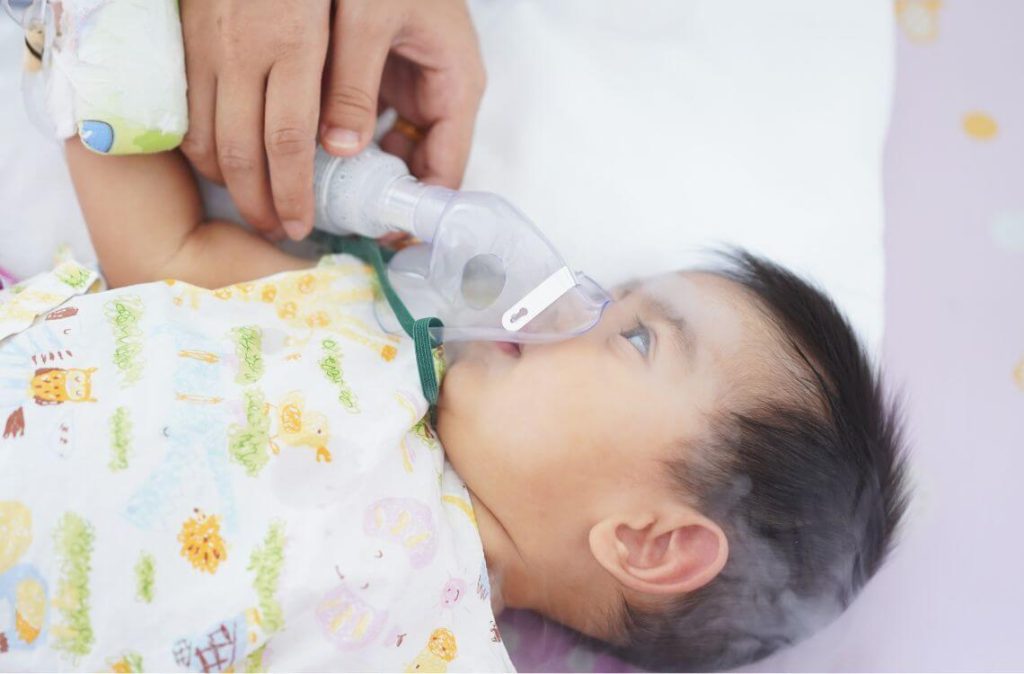Asthma can start at any age, even for babies. It may get better, worse, or remain the same as they age.
But whichever way, parents should be well-informed on how to deal with it regardless.
What is Asthma
Asthma is the long term effect upon the respiratory system that makes breathing difficult. It is considered permanent in most cases and varies in severity.
What happens during an attack is the airways constrict due to allergic or bodily reaction which makes it difficult to bring air in and out of the lungs.
Breath rate increases in attempt to get enough oxygen due to shortness of breath.
Asthma is an underlying condition that can get triggered by events. For example, allergens, exertion and stress.
These events can trigger asthma and make it suddenly difficult to breathe. The more serious asthma is, the easier it is to trigger it.
Causes of Asthma
Allergies
When your baby has allergies, one of the mechanisms that occurs in the body is the release of histamine by immune cells. A side effect of histamine is constriction of muscles in the lungs.
This narrows the airways and causes difficulty in breathing. Prolonged exposure to allergens can cause long-term or permanent asthma.
Allergies is the most common cause of asthma in young children and this type is called primary asthma.
It is usually classified as intermittent but can become persistent.
Family History
If your family has a history of asthma, it is likely your baby will develop it as well. It is not a guarantee of the disease, but you should keep an extra cautious eye out for signs.
The genes that increase the chances of asthma can be passed down bloodlines and while it may be inconvenient, remember that it is not a very serious disease with proper treatment and care.
Smoking During Pregnancy
Smoking and other endangering practices during pregnancy can result in respiratory damage to your baby. As the foetus develops it is affected by the habits of the mother.
There is so much that connect the mother and baby during pregnancy as well as after birth. Staying healthy can keep your baby healthy too.
Respiratory Virus
Some respiratory viruses are milder but others can be quite damaging.
If the damage done to the respiratory tracts is irreversible, then asthma will develop with very little chance of a full recovery.
Taking care of respiratory disease quickly can reduce the chances of developing asthma but there are some times where nothing can be done.
Try to manage these diseases and use medications with the help of your paediatrician.
Symptoms of Asthma
Most symptoms of asthma are either a variation of difficulty in breathing or a result of it.
It can be difficult to detect in babies as they may not cry out or give any other indication.
As they are unable to communicate, it is up to parents to be able to observe the symptoms in their babies.
Take note of these symptoms so you are able to help your baby:
- Fast breathing (hyperventilating)
- Laboured breathing
- Panting
- Wheezing
- Difficulty eating
- Cyanosis (bluish colouring due to lack of oxygen)
- Persistent cough
Since it is easy to overlook some of these symptoms, ensure you take note of any changes in your baby’s behaviour.
Even an increase in crankiness could indicate that there is something wrong.
Babies can’t tell us what is going on with them, so we have to be perceptive enough to figure it out.
Treatment for Asthma
The main method of treatment for asthma is inhalers. They can be small and portable or mask-like; which is used for babies and the very elderly.
Also called bronchodilators, inhalers work by expanding the airways to allow normal breathing.
If an allergic reaction closes up the airways, this helps to reverse that reaction.
Examples of the medication used are salbutamol and albuterol. With inhalers, it sprays like a mist inside the throat but you can also find it in the form of tablets, capsules or syrups.
What Comes Next
Asthma can be worrying as it is usually a long term issue.
That being said, millions of people live their lives with it and are not any worse off than normal.
Learning how to deal with asthma is simple and your baby will most likely grow up perfectly healthy apart from a few medical limitations.
You’ve got this, parents!
For more insightful stories and fun recipes, stay tuned to Motherhood Story!
